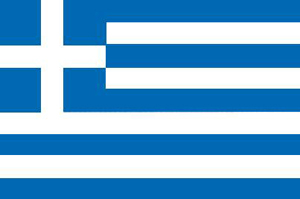About Greece
 0 Comment(s)
0 Comment(s) Print
Print E-mail China.org.cn, May 22, 2012
E-mail China.org.cn, May 22, 2012
Official Name: The Hellenic Republic
|
|
Geography
Total area: 131, 957 sq. km
Capital city: Athens
Terrain: mostly Mountains ranges extending to the sea as peninsulas or chains of islands
Climate: temperate with hot, dry summers and mild, rainy winters
People
Nationality: Greek
Population (2011 census preliminary data): 10,787,690
Ethnic groups: 94% Greek, 4% Albanian, 2% others
Religions: Greek Orthodox, Muslim
Language: Greek
Government
Type: Parliamentary democracy
Legal System: Based on Roman law, judiciary divided into civil, criminal, and administrative courts
Political parties: New Democracy (ND) and Pan-Hellenic Socialist Movement (PASOK)
Head of State: President
Top legislative power: Unicameral Parliament– 300 seats; members are elected by direct popular vote to four-year terms
Administrative divisions: 13 regions subdivided into a total of 325 municipalities
Major cities: Athens, Thessaloniki, Patras, Iraklio, Volos
Economy
GDP (2011): Euro 182,310 million
GDP growth rate (2011): -6.9%
Natural resources: Lignite, iron ore, bauxite, lead, zinc, nickel, magnesite, marble, salt
Currency: euro
Greece is highly appealing as an investment location because it offers businesspeople a wide variety of investment opportunities that take advantage of the country's strategic geographic location and unique competitive advantages. Greece is a natural gateway to more than 140 million consumers in Southeast Europe and the Eastern Mediterranean, a region with a GDP of almost 1 trillion Euros. As the hub of diverse emerging markets, Greece provides access to a population with a strong demand for consumer goods, infrastructure modernization, technology and innovation networks, energy, tourism development, and light manufacturing.
Greek companies have a strong foothold in the region and are among the top three investors in every market. Over the last few years, more than 4,000 Greek companies have invested more than 15 billion Euros in Southeast Europe. In financial services alone, more than 3,000 branches of Greek banks are active in the region.
Investors are discovering that Greece has a combination of characteristics that are unparalleled in Europe. Greece is a leading global tourism destination, an emerging regional energy hub, and possesses human capital that is outstanding.
History
Greece is a country with a particularly rich history and famous personalities.
Excavations show that the first settlement dates from the Paleolithic era (11,000-3,000 BC). During the second millennium BC, Greece gave birth to the great civilization of the Minoans (2600-1500 BC), the Mycenaeans (1500-1150 BC) and the Cycladic civilization.
The Classical Period of the Greek history (6th-4th centuries BC) is the most well known. The peak of the classical period is the 5th century BC, when the foundations of western civilization began in Athens. The city-state became the greatest naval power of Greece that time and developed all forms of advanced culture, including philosophy, music, drama, rhetoric and a new regime, democracy.
The history of Greece is a succession of various invasions and dominations. In 334 BC, Alexander the Great invaded the Persian Empire and his army conquered much of Asia, eventually reaching India. However, in 323 BC, the great general died in Babylon and his Macedonian empire was torn apart and governed by his heirs. In 168 BC, the Romans conquered Greece and a new period began in Greek history.
In the 3rd century AD, the Roman Empire was cut in two pieces into the Eastern and the Western Roman Empire. While the Western Roman Empire was gradually invaded by barbaric North-European tribes, the Eastern Roman Empire with Constantinople as capital developed and became the Byzantine Empire that lasted for about 1,000 years.
In 1453 BC, the Ottoman Turks conquered Constantinople and gradually the rest of Greece, which had already been dominated by the Venetians. The country suffered a lot under the Ottoman occupation and the Greek people tried to rebel many times. However, all rebellions were suppressed until March 1821 when the Greek War of Independence started. The country finally got its freedom in 1829, when the first independent Greek state was formed and Ioannis Kapodistrias assumed the role as governor.
After Kapodistrias was assassinated in 1831, prince Otto from Bavaria became the first king of Greece, followed by George I from Denmark in 1863. That time, the Ionian Islands were given to Greece by Britain and then Thessaly was attached to the Greek state by the Turks. In the early 20th century, Macedonia, Crete and the Eastern Aegean islands were also attached to the Greek state. This was the time when an important Greek politician, Eleftherios Venizelos, came into prominence.
Greece resisted the Axis forces during the Second World War, but it eventually surrendered. Most of the Greek territory was occupied by the Germans and some parts by the Italians. After the Second World War, the Dodecanese islands also became part of the Greek state. Three decades of political turmoil followed, including a military junta from 1967 till 1974. Since 1975, Greece has been a parliamentary republic.







Go to Forum >>0 Comment(s)